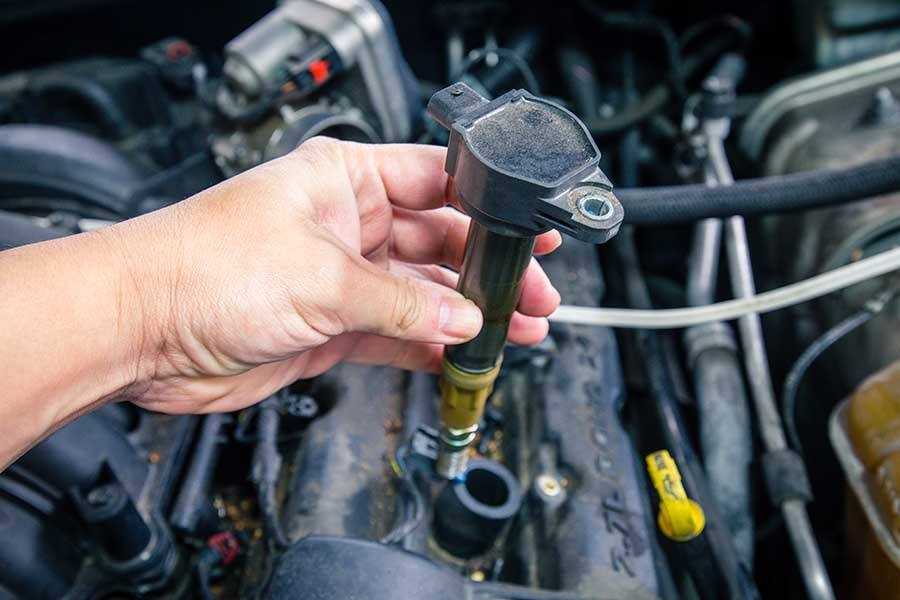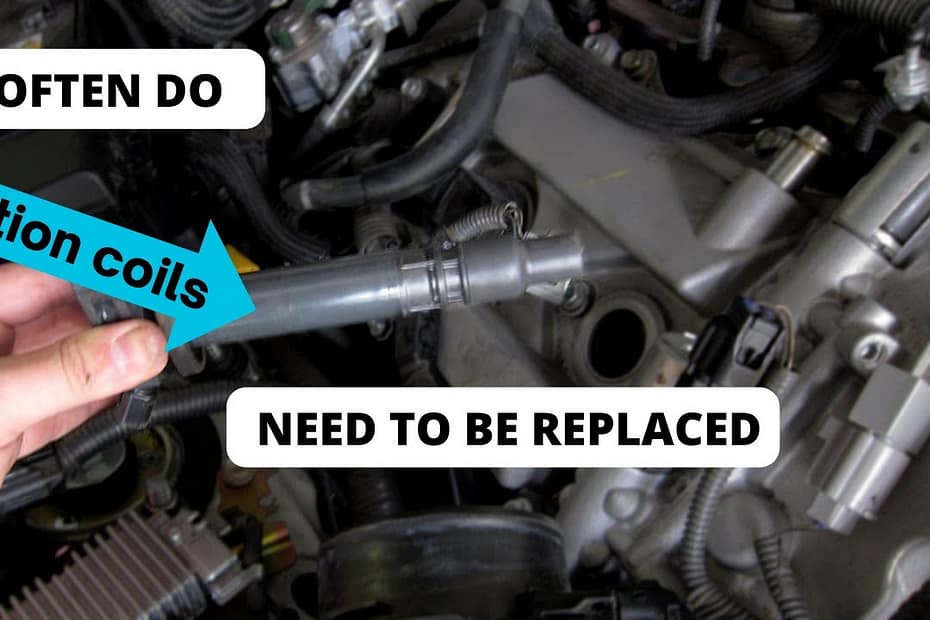Ignition coils should be replaced every 100,000 miles or as recommended by the manufacturer. Regular maintenance and monitoring can help identify issues before they become major problems.
Maintaining your vehicle’s ignition system is crucial for optimal performance and fuel efficiency. Ignition coils play a key role in delivering power to the spark plugs, igniting the air-fuel mixture in the engine. Over time, these coils can degrade, leading to misfires, rough idling, and decreased fuel economy.
By understanding when to replace ignition coils and recognizing the signs of wear, you can proactively address any issues and keep your vehicle running smoothly. We will discuss how often you should replace ignition coils, signs of potential failure, and the importance of regular maintenance to ensure reliable vehicle operation.
Signs Of Faulty Ignition Coils
Recognizing the signs of faulty ignition coils is crucial to maintaining the performance and efficiency of your vehicle. Ignition coils play a critical role in the ignition system, providing the high voltage needed to ignite the fuel and air mixture in each cylinder. When these coils start to fail, it can lead to a range of issues that, if left unaddressed, can result in costly repairs. Here are three common signs that indicate your ignition coils may be faulty:
Engine Misfires
One of the primary signs of faulty ignition coils is engine misfires. Misfires occur when the spark plugs fail to ignite the fuel and air mixture in the cylinder at the right time. If you notice that your engine is vibrating or shaking excessively, or if you experience a loss of power or poor acceleration, it could be an indication that one or more ignition coils are malfunctioning. Ignition coil-related misfires may also manifest as rough idling or a noticeable decrease in engine performance.
Decreased Fuel Efficiency
Faulty ignition coils can also lead to decreased fuel efficiency. When the ignition coils fail to generate a strong enough spark, the fuel and air mixture may not burn efficiently within the cylinders. As a result, your vehicle may require more fuel to achieve the same level of performance, causing a noticeable decrease in fuel economy. If you find yourself frequently visiting the gas station or noticing a sudden drop in mileage, it may be time to inspect and replace your ignition coils.

Credit: carfromjapan.com
Factors Influencing Ignition Coil Lifespan
When it comes to the lifespan of ignition coils, there are several factors that can influence how often they need to be replaced. Understanding these factors can help drivers maintain their vehicle’s ignition system and avoid potential issues down the road.
Quality Of Ignition Coils
The quality of the ignition coils used in a vehicle plays a significant role in determining their lifespan. Low-quality or counterfeit coils are more likely to fail prematurely, leading to issues such as engine misfires and reduced fuel efficiency. Investing in genuine OEM or high-quality aftermarket coils can help extend the lifespan of the ignition system.
Driving Conditions
The driving conditions a vehicle is subjected to can also impact the longevity of the ignition coils. Frequent stop-and-go driving or heavy city traffic can put additional stress on the coils, potentially leading to earlier failure. Similarly, driving in extreme temperatures, whether very hot or very cold, can also affect the performance and lifespan of the coils.
Recommended Frequency Of Replacement
When it comes to ensuring the optimal performance of your vehicle’s ignition system, knowing the recommended frequency of replacement for ignition coils is crucial. Understanding when to replace ignition coils can help prevent potential engine misfires, loss of power, and fuel inefficiency. Manufacturer guidelines and common mileage intervals play significant roles in determining when to replace ignition coils.
Manufacturer Guidelines
Manufacturers typically provide specific recommendations for the replacement of ignition coils in the owner’s manual or maintenance guide. It’s essential to adhere to these guidelines to maintain the efficiency and reliability of the ignition system. Ignoring the manufacturer’s recommendations might lead to preventable malfunctions and expenses in the long run.
Common Mileage Intervals
In addition to following manufacturer guidelines, common mileage intervals are often used as a general rule of thumb for replacing ignition coils. While the exact mileage can vary depending on the make and model of the vehicle, it’s generally recommended to consider replacing ignition coils every 100,000 miles. This proactive approach can help avoid potential issues associated with worn-out or malfunctioning ignition coils.

Credit: stevesautorepairva.com
Diy Vs Professional Replacement
When it comes to replacing ignition coils, you have two options – the DIY route or seeking professional help. Both approaches have their pros and cons, so it’s essential to consider your personal skill level, tools and expertise required, and cost considerations before making a decision.
Tools And Expertise Required
If you decide to go the DIY route, you’ll need a few tools to assist you in replacing the ignition coils. These tools typically include a socket wrench, pliers, a spark plug socket, and a torque wrench. It’s crucial to ensure you have the correct tools at your disposal to prevent any damage during the replacement process.
However, expertise plays a significant role in the DIY approach. While replacing ignition coils might seem like a straightforward task, it requires a certain level of automotive knowledge and skills. If you’re familiar with basic car maintenance and have experience working on engines, you may feel confident enough to tackle this task yourself.
On the other hand, professional replacement takes the guesswork out of the equation. Automotive mechanics have the expertise and experience necessary to handle the intricacies of ignition coil replacement. They have access to specialized tools and diagnostic equipment that enable them to efficiently diagnose and replace faulty coils, ensuring the job is done correctly.
Cost Considerations
When considering whether to replace ignition coils yourself or hire a professional, cost is a crucial factor to keep in mind. DIY replacement may seem more affordable at first glance, as it eliminates labor costs. However, you’ll need to factor in the cost of purchasing the necessary tools and equipment, which can vary depending on their quality.
In contrast, professional replacement might come with higher upfront costs due to labor expenses. However, these costs often include not only the replacement of the ignition coils but also a thorough inspection of the entire ignition system. This ensures that any underlying issues are addressed, preventing potential future problems and potential additional costs down the line.
Furthermore, professional replacement often comes with warranties, providing you with peace of mind knowing that you’re covered in case something goes wrong. In contrast, DIY replacement offers no such guarantees.
Ultimately, the decision between DIY and professional ignition coil replacement depends on your comfort level, expertise, and financial considerations. If you’re confident in your automotive skills and have the necessary tools, DIY replacement might be a cost-effective option. However, if you’re unsure or prefer the assurance of expert knowledge, it’s worth considering seeking professional assistance.
How To Extend The Lifespan Of Ignition Coils
How to Extend the Lifespan of Ignition Coils
Regular Maintenance Practices
Regular maintenance plays a critical role in extending the life of ignition coils.
- Ensure timely replacement of spark plugs to prevent stress on the ignition coils.
- Inspect and clean the ignition coil housing to prevent dirt and debris buildup.
- Check for any signs of corrosion or damage and address them promptly.
Avoiding Common Mistakes
Avoiding common mistakes can help prevent premature ignition coil failure.
- Do not ignore check engine light warnings that could indicate ignition coil issues.
- Avoid overloading the vehicle which can strain the ignition coils.
- Ensure proper installation and avoid using incorrect voltage components.

Credit: swperformanceparts.com
Frequently Asked Questions On How Often To Replace Ignition Coils
How Long Do Ignition Coils Usually Last?
Ignition coils typically last around 100,000 miles or 7-10 years before needing replacement. Regular maintenance can prolong their lifespan.
How Do I Know If My Ignition Coil Needs Changing?
You can determine if your ignition coil needs changing by looking out for signs like engine misfires, rough idle, difficulty starting the car, and decreased fuel efficiency. Additionally, if you notice a burning smell or see visible damage on the coil, it may need to be replaced.
When Should I Replace My Ignition Coils?
Replace your ignition coils if you experience rough idling, misfiring, or a decrease in fuel efficiency. It’s also wise to replace them as part of regular maintenance, typically every 100,000 miles or as recommended by your vehicle’s manufacturer. Regular inspections can also help identify any potential issues.
How Often Should You Change Spark Plugs And Coil Packs?
Spark plugs should be changed every 30,000 miles, while coil packs typically last around 100,000 miles. Regular maintenance helps ensure optimal engine performance.
Conclusion
Regularly replacing ignition coils is essential for maintaining the optimal performance of your vehicle’s ignition system. By replacing worn-out coils timely, you can prevent issues like misfires, reduced fuel efficiency, and decreased engine power. Regular maintenance and inspection intervals, as recommended by the manufacturer, will ensure your ignition coils are functioning properly and prolong the lifespan of your vehicle.
Stay proactive with ignition coil replacement to keep your engine running smoothly and efficiently.
